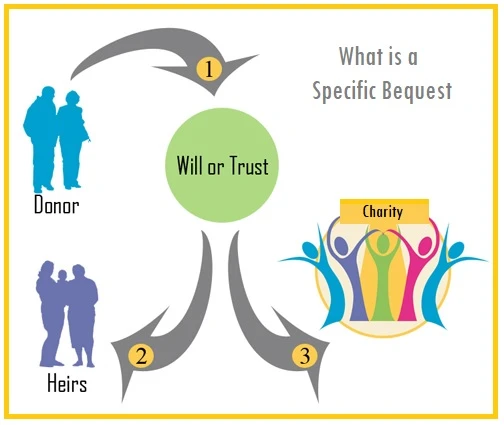
A specific bequest is a special provision in a will where you designate certain personal items, money, stocks, or other assets to specific individuals or purposes. It’s a way to ensure that your chosen beneficiaries receive exactly what you intend for them, clearly outlining their entitlements. This allows you to express your wishes precisely about who should inherit particular items or assets, ensuring your instructions are followed when your estate is distributed. This can avoid family conflicts and maintain the tradition of the family. Therefore, individuals pass particular items or assets to loved ones or chosen organizations.
Numerous reasons explain why specific bequests are important. First, they preserve sentimental value by transferring objects with personal significance like family heirlooms as well as cherished mementos. Second, peoples’ traditions may also be kept through this means since it allows them to share stories and memories by transferring over certain things. Third, practical purposes should not be forgotten; hence, issues concerning transfer of business ownership or distribution of unique assets to intended recipients must be resolved.
In preparing an estate plan, one can provide different kinds of gifts such as financial assets, antiques, pets, collections and charitable donations. It is important describing the items being bequeathed in a clear and specific manner as well as using names of beneficiaries and providing context about the relationship with recipients. Additionally, consistency in style and language throughout the will helps avoid confusion and ensures clarity.
1. Monetary Gift with Special Instructions: Emily (Niece) – I would like to receive $10,000 for her college education.
2. Specific Item with Special Instructions: James (nephew) – I’d would like to inherit my antique pocket watch and continue passing it down as a family heirloom.
3. Charity with Special Instructions: Animal Rescue Foundation – I’m leaving $50,000 designated to help cover medical costs for abandoned animals.
4. Stocks or Investments: Sarah Gold (Cousin) I’m giving 100 shares of (XYZ) Company stock.
5. Real Estate: David Ross (Friend) – I’m leaving my beach house at (address).
6. Artwork or Collectibles: Lisa Brenner, (Friend) will inherit my collection of vintage vinyl records.
Just because something means a great deal to you does not mean that it will mean the same to everyone. Truly consider to whom you are bequeathing your precious assets and how they may be received.
While you’ve amassed many rare books as a dedicated reader, consider not leaving them to a nephew uninterested in reading since high school. This beneficiary may not appreciate their true value and could underestimate what they’ve inherited.
You know the value of what you have, but that doesn’t mean everyone will. Take the example of passing down books that have become collector’s items. To someone who doesn’t know any better, it may look like they have inherited a pile of books they won’t read and don’t need. They may even try to sell them and severely undercut their value because they didn’t know what they had.
The executor named in the will manages specific gifts when one dies whereby their will undergoes Probate Court. When there are controversies that arise from such occasions testimonials and documentation help resolve these while a unambiguous will is helpful for this process too. By way of specific gifts persons can leave behind a lasting impact on sentimental stuffs and memories even after passing away.